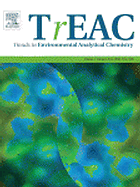|
Literature / Source Database:
Trends in Environmental Analytical Chemistry
Description
Trends in Environmental Analytical Chemistry is devoted to publishing concise and critical overviews of the rapid changes and development in the field of environmental analytical chemistry.
| Title (short) |
Trends Environ. Anal. Chem. |
| Title (abbrev) |
TREAC |
| Languages |
English |
| Editor |
M. Petrovic |
|
|

|
Status
active
Subject

Source type
Journal
Publisher
ISBN ISSN
2214-1588
First volume
1
Last volume
3+
Homepage
| Resources |
|
Availability |
|
|
|
|
|
| Text PDF |
 |
free access |
 |
| Text Html |
 |
for subscriber |
 |
| References |
 |
not available |
 |
| Abstracts |
 |
|
|
| TOC |
 |
|
|
|
|
|
|

Description
Trends in Environmental Analytical Chemistry is devoted to publishing concise and critical overviews of the rapid changes and development in the field of environmental analytical chemistry. The acquisition of good quality chemical data in environmental systems and the sound interpretation of this data is the basis for enhancing our understanding of the environment. TrEAC provides timely coverage of the novel and innovative use of analytical methods for the investigation of environmentally relevant substances and problems. Topics of interest include critical updates on the improvements in environmental analytical chemistry, achievements and challenges of modern techniques and possible future developments in the specific fields, such as sampling methodology, techniques for remote measurements, analytical instrumentation, miniaturization and automation, determination of trace atmospheric constituents of anthropogenic and natural origin, detection and identification of organic pollutants in water, soil and biota, determination and speciation of heavy metals and radionuclides in the environment, environmental references materials; method validation and chemometrics in environmental analysis.The aim of TrEAC is to publish concise reviews covering the latest advances in environmental analytical chemistry. Reviews should comprise about 4000 words and include several figures and tables. Reviews should interpret rather than be comprehensive. References should be limited to about 60. Primary research papers describing the results of the authors' research work are not within the scope of TrEAC. Please note that most articles published in the journal are by invitation of one of the Editors. If you wish to submit a paper to TrEAC and have not been invited by one of the Editors, please submit first a short proposal (max 1 page) to the Editor-in-Chief. All reviews will be subject to peer review and should be submitted through the Elsevier Editorial System
|